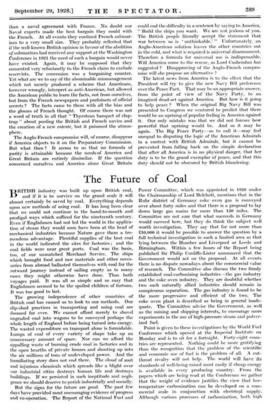The Future of Coal
BRITISH industry was built up upon British coal, and if it is to survive on the grand scale it will almost certainly be saved by coal. Everything depends upon new methods of using coal. It has long been clear that we could not continue in the hand-to-mouth and prodigal ways which sufficed for the nineteenth century. Even if Englishmen had not led the world in the applica- tion of steam they would soon have been at the head of mechanical industries because Nature gave them a tre- mendous advantage. Plentiful supplies of the best coal in the world indicated the sites for factories ; and the coal fields were near great ports. Coal was the basis, too, of our unmatched Merchant Service. The ships which brought food and raw materials and other neces- saries from abroad ballasted themselves with coal for the outward journey instead of sailing empty as in many cases they might otherwise have done. Thus both voyages paid. It was all so simple and so easy that Englishmen seemed to be the spoiled children of fortune. It was too good to last.
The growing independence of other countries of British coal has caused us to look to our methods. Our slip-shod practices in transporting and using coal are doomed for ever. We cannot afford merely to shovel ungraded coal into wagons to be conveyed perhaps the whole length of England before being turned into energy. The wasted expenditure on transport alone is formidable. Lumps of coal of every variety of shape take up an unnecessary amount of space. Nor can we afford the appalling waste of burning crude coal in factories and in the open hearths of private houses and shooting up into the air millions of tons of undeveloped power. And the humiliating story does not end there. The cloud of soot and injurious chemicals which spreads like a blight over our industrial cities destroys human life and destroys buildings. If we persisted in such ineptitude and negli- gence we should deserve to perish industrially and socially.
But the signs for the future are good. The past few days have provided most encouraging evidence of progress and•co-operation. The Report of the National Fuel and Power Committee, which was appointed in 1926 under the Chairmanship of Lord Melchett, mentions that in the Ruhr district of Germany coke oven gas is conveyed over about forty miles and that there is a proposal to lay down large gas mains for more than 150 miles. The Committee are not sure that what succeeds in Germany would succeed here, but they do think the subject well worth investigation. They say that for not more than £10,000 it would be possible to answer the question by a full technical investigation in such a limited area as that lying between the Humber and Liverpool or Leeds and Birmingham. Within a few hours of the Report being published Sir Philip Cunliffe-Lister announced that the Government would act on the proposal. At all events there is no dispute nowadays about the commercial value of research. The Committee also discuss the two firmly established coal-carbonizing industries—the gas industry and the coke oven industry. They are doubtful whether two such naturally allied industries should remain in conspicuous separation. The gas industry is found to be the more progressive and efficient of the two. The coke oven plant is described as being in general inade- quate. The Committee advise the Government, as well as the mining and shipping interests, to encourage more experiments in the use of high-pressure steam and pulver- ized fuel.
Point is given to these investigations by the World Fuel Conference which opened at the Imperial Institute on Monday and is to sit for a fortnight. Forty-eight coun- tries are represented. Nothing could be more gratifying than the recognition that the problem of the scientific and economic use of fuel is the problem of all. A cut- throat rivalry will not help. The world will have its standards of well-being raised most easily if cheap energy is available in every producing country. From the papers which are being read at the Conference we gather that the weight of evidence justifies the view that low- temperature carbonization can be developed on a com- mercial scale in conjunction with electrical supply. Although various processes of carbonization, both high" temperature and low temperature, have been tested over a period of years, it was not certain that the commercially paying stage had yet been reached. But it seems now that when the low temperature process is allied with electrical supply the scale is at last tilted successfully. One's thoughts turn, of course, to the great scheme for supplying electrical energy all over the country. The opportunity seems to be golden ; the power scheme and the researches in carbonization have happily converged. The time is not far distant when coal will be resolved at or near its source into its constituent elements and made to yield its by-products of oil and chemical materials before it goes on to provide the industrial or private consumer with gas and electric light and energy, and warmth. We used to talk in our folly about electricity making gas obsolete, but we see now that gas, electricity, oil, and chemical by-products are not rivals but co- operators. And in combination they will at last give us smokeless skies.





































 Previous page
Previous page